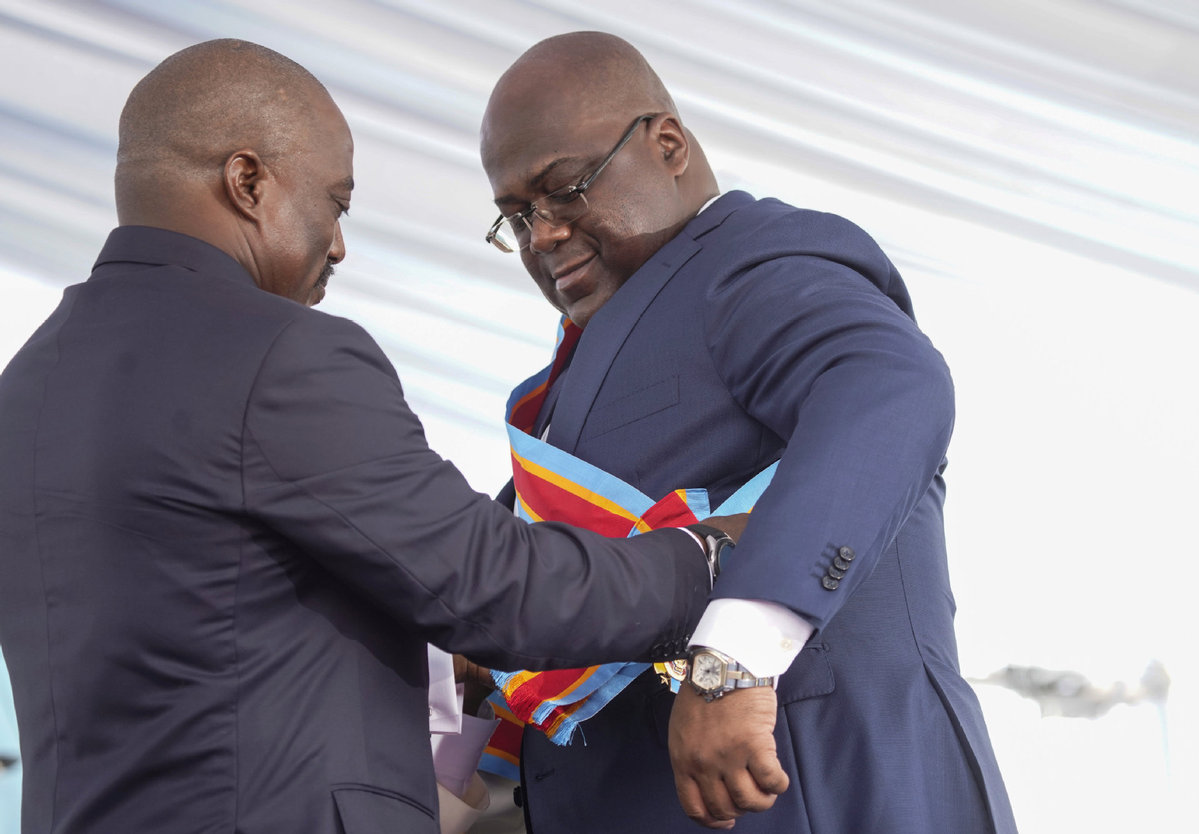It was a historic moment for the Democratic Republic of Congo as outgoing president Joseph Kabila handed over power to Felix Tshisekedi last week in a ceremony held at the Palais de la Nation in the capital Kinshasa.
The event, which marked the first peaceful transition of power in the country, will see Tshisekedi steer the country for five years as stipulated by the constitution. He is also eligible to seek a second term.

Felix Tshisekedi receives the presidential sash from the outgoing President Joseph Kabila during the inauguration ceremony whereby Tshisekedi was sworn into office as the new president of the Democratic Republic of Congo at the Palais de la Nation in Kinshasa, Democratic Republic of Congo, Jan 24, 2019. (Photo: Agencies)
Tshisekedi is now tasked with implementing his campaign pledges of reducing poverty, increasing access to free education and health services and improving peace and security, particularly in the eastern region of the country.
Security issues and an ebola outbreak led the electoral body exclude the cities of Beni and Butembo and surrounding areas from participating in the presidential election.
In his inauguration speech, Tshisekedi called for a reconciled Congo and vowed to build an inclusive country where "everyone has a place".
"We want to build a strong Congo, turned toward its development in peace and security," he said.
Kabila, in his last state of nation address, called for national unity. Addressing the nation on the eve of the inauguration, he congratulated Tshisekedi and said he was ready to assist in the interest of the country whenever required.
The elections body declared Tshisekedi the winner of last year's presidential election. The victory was upheld by the Constitutional Court that dismissed a poll petition brought by his closest rival Martin Fayulu.
All-inclusive government
Herman Manyora, a political analyst in Nairobi, Kenya, said this is a new dawn for the DRC. He said Tshisekedi should make a deliberate move to build an all-inclusive government that brings in opposition leaders to further stabilize the country. "The ruling of the Constitutional Court was final. The country should now start planning for the next five years."
Further instability in the country would not only exacerbate poverty but also may spill over to neighboring countries, said Manyora. And this usually compounds existing economic, environmental and social challenges facing host governments. "Congo is in the heart of the continent, and any crisis will swallow many other countries," said the analyst.
Tshisekedi is also expected to accelerate economic transformation as the country continues to heavily rely on the export of primary commodities. In 2018, the economy recorded sluggish growth from 2.4 percent in 2016 to 4 percent riding on recovering commodities prices and national mining production, particularly of copper and cobalt.
He therefore needs political backing, said Manyora, noting that among his first tasks in office is choosing a prime minister, likely to come from pro-Kabila lawmakers who dominate the National Assembly.
Cavince Adhere, an analyst based in Nairobi, said the narrow margin between Tshisekedi and Fayulu shows it was a tight race. "This means that the people are looking for real change. An all-inclusive government will ensure some regions do not feel marginalized and are part of rebuilding the country."


